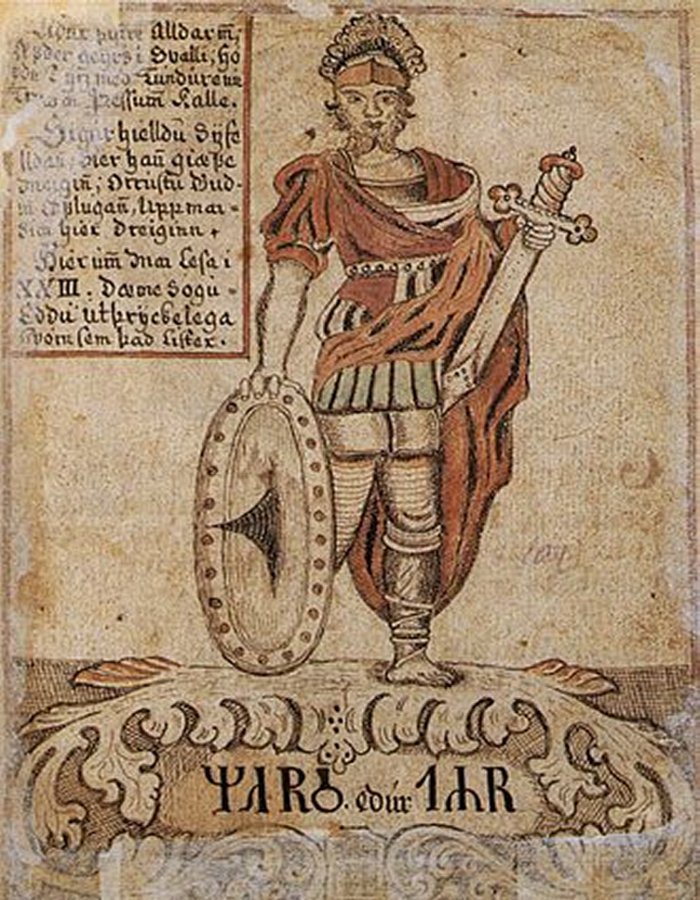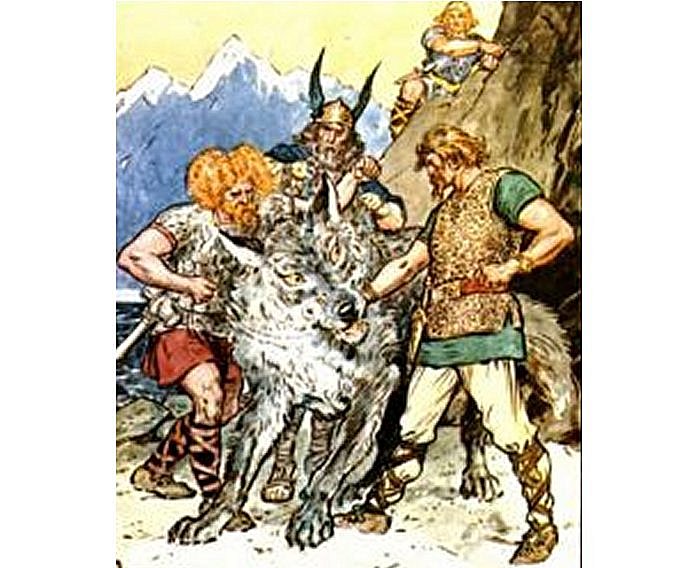Norse God Tyr Who Gave Viking Warriors Courage And Self-Confidence In Battle
A. Sutherland - AncientPages.com - At one time in the distant past, Tyr was a god of war and a sky god. He was concerned with justice and with reasonable and fair treaties.
There is a version according to which Tyr was the main god among the gods of Aesir, and he was their leader.
Týr equated with Mars in an 18th-century manuscript (ÍB 299 4to). Image uploader: Michelmfb - Public Domain
At the time, he might have been the leader of the Norse Pantheon, and his role was even more significant than Odin.
It was before Odin had become the undisputed chief of the gods. Later, his role as the chief god was significantly diminished. In some stories, he is the son of the giant Hymir, and in later Norse beliefs, when the myths were written down, Tyr was referred to as Odin's son and the patron of warriors.
He is associated with law and glory, and he embodies bravery.
Otherwise, little is known about him, and few traditions connected with him have survived.
Many researchers have unsuccessfully attributed to God Tyr different features in their assumptions. Tyr is a very complex and enigmatic figure in the Norse pantheon, and it is even uncertain whether Tyr was a forerunner of the god Odin; this combination is not mentioned in the Eddas and North mythical stories recorded by the 13th-century Icelandic poet Snorri Sturluson.
As to his bravery, this feature of the god Tyr is mentioned in the Icelandic Eddas. Tyr is considered the bravest of all the gods of Aesir because he is the only one who decides to put his hand into the jaws of the terrible wolf, Fenrir.
Image credit: Charles E Brock, 1930. Public Domain
Fenrir bit off Tyr's hand when the other gods broke their word to the beast and tied him up.
Therefore, most depictions of Tyr show him as the one-handed god.
According to the Poetic Edda and Prose Edda, the gods decided to chain the wolf Fenrir at one stage, but the beast broke every chain or rope they put upon him.
Finally, the dwarves made a magical silk ribbon called Gleipnir, but Fenrir sensed the gods' deceit and refused to be bound by it. He explained that Gleipnir was very thin, and there would be no fame for him if he tore such a delicate chain unless – one of the gods put his hand in the wolf's mouth.
No one dared to fulfill Fenrir's request except the brave Tyr. When the gods saw that Fenrir was bound, they celebrated, but Tyr did not do it.
He knew that Fenrir would remain bound until the day of Ragnarok.
Tyr has remained the most enigmatic figure in Norse mythology and is one of the important heroes of the Scandinavian epic. Both bravery and heroism are attributed to him. If a warrior carved a rune into his weapon, it became a weapon of Tyr's. It was believed that such a weapon significantly increased that warrior's chances of success in battle.
Numerous spears have been unearthed on which runic inscriptions say that these spears are "dedicated to the wise and brave Tyr."
Viking warriors used to call upon him in battle; he gave them courage and self-confidence. This god is remembered and surrounded with deep respect, and captains and princes are designated after him.
Written by – A. Sutherland AncientPages.com Staff Writer
Updated on November 23, 2023
Copyright © AncientPages.com All rights reserved. This material may not be published, broadcast, rewritten or redistributed in whole or part without the express written permission of AncientPages.com
Expand for referencesReferences:
Paul Watkins P. Thunder God
Viktor Rydberg V. Teutonic Mythology
More From Ancient Pages
-
 The Olympics In Ancient And Modern Times – What Has Changed?
Featured Stories | Jun 20, 2019
The Olympics In Ancient And Modern Times – What Has Changed?
Featured Stories | Jun 20, 2019 -
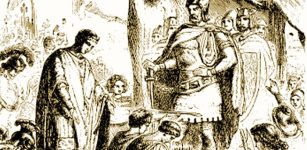 On This Day In History: Emperor Romulus Augustus Deposed – On September 4, 476
News | Sep 4, 2016
On This Day In History: Emperor Romulus Augustus Deposed – On September 4, 476
News | Sep 4, 2016 -
 Intriguing Million-Year-Old Human Skull Offers Key Clues To Our Evolution
Archaeology | Sep 30, 2022
Intriguing Million-Year-Old Human Skull Offers Key Clues To Our Evolution
Archaeology | Sep 30, 2022 -
 Denisovan Genetic Heritage Could Affect The Mental Health Of European And Asian Populations
DNA | Oct 31, 2023
Denisovan Genetic Heritage Could Affect The Mental Health Of European And Asian Populations
DNA | Oct 31, 2023 -
 Being A Roman Emperor Was Dangerous – Only One Of Four Died Of Natural Causes
Archaeology | Nov 12, 2021
Being A Roman Emperor Was Dangerous – Only One Of Four Died Of Natural Causes
Archaeology | Nov 12, 2021 -
 Tarascan Indians: Intriguing Pre-Columbian Civilization Of Artists, Warriors And Skilled Metallurgists
Civilizations | Sep 9, 2021
Tarascan Indians: Intriguing Pre-Columbian Civilization Of Artists, Warriors And Skilled Metallurgists
Civilizations | Sep 9, 2021 -
 ‘Joyeuse’ – Legendary Sword With Relics Of Saints Was A Private Treasure Of Emperor Charlemagne
Artifacts | Dec 24, 2021
‘Joyeuse’ – Legendary Sword With Relics Of Saints Was A Private Treasure Of Emperor Charlemagne
Artifacts | Dec 24, 2021 -
 3D-printed replica of an artefact revives music of Iron-Age Ireland
News | Sep 4, 2015
3D-printed replica of an artefact revives music of Iron-Age Ireland
News | Sep 4, 2015 -
 Archaeologists Refute Claims That A Comet Destroyed Hopewell Culture
Archaeology | Aug 11, 2023
Archaeologists Refute Claims That A Comet Destroyed Hopewell Culture
Archaeology | Aug 11, 2023 -
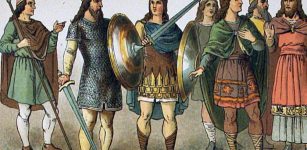 Being Anglo-Saxon Was A Matter Of Language And Culture, Not Genetics
Archaeology | Jun 23, 2021
Being Anglo-Saxon Was A Matter Of Language And Culture, Not Genetics
Archaeology | Jun 23, 2021 -
 Unexpected Discovery Of Two Viking Swords In Upright Position In Sweden
Archaeology | Oct 27, 2022
Unexpected Discovery Of Two Viking Swords In Upright Position In Sweden
Archaeology | Oct 27, 2022 -
 Qilin – One Of Four Noble Animals In Chinese Myths And Legends
Chinese Mythology | Jan 26, 2021
Qilin – One Of Four Noble Animals In Chinese Myths And Legends
Chinese Mythology | Jan 26, 2021 -
 The Legend Of Little Deer—Interesting Cherokee Tale Of How Disease And Medicine Began, And Why The Native Americans Respect All Life
Featured Stories | May 10, 2017
The Legend Of Little Deer—Interesting Cherokee Tale Of How Disease And Medicine Began, And Why The Native Americans Respect All Life
Featured Stories | May 10, 2017 -
 Unusual 4,000-Year-Old Site And Other Curiosities Discovered In Overstone, Northamptonshire, UK
Archaeology | Jan 10, 2023
Unusual 4,000-Year-Old Site And Other Curiosities Discovered In Overstone, Northamptonshire, UK
Archaeology | Jan 10, 2023 -
 We Need To Look Underwater To Understand Our Past – New Study
Archaeology | Apr 14, 2023
We Need To Look Underwater To Understand Our Past – New Study
Archaeology | Apr 14, 2023 -
 What Is Pax Sinica?
Ancient History Facts | Apr 26, 2018
What Is Pax Sinica?
Ancient History Facts | Apr 26, 2018 -
 On This Day In History: Howard Carter Discovered King Tut’s Tomb In The Valley Of The Kings – On Nov 4, 1922
News | Nov 4, 2016
On This Day In History: Howard Carter Discovered King Tut’s Tomb In The Valley Of The Kings – On Nov 4, 1922
News | Nov 4, 2016 -
 Ancient Magical Bowls Inscribed With Spells And Other Rare Artifacts Seized In Jerusalem Raid
Archaeology | Mar 14, 2022
Ancient Magical Bowls Inscribed With Spells And Other Rare Artifacts Seized In Jerusalem Raid
Archaeology | Mar 14, 2022 -
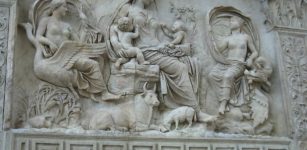 What Was Pax Deorum And How Important Was It?
Ancient History Facts | Apr 30, 2023
What Was Pax Deorum And How Important Was It?
Ancient History Facts | Apr 30, 2023 -
 Nakanishi Ruins: One Of Japan’s Largest Ruins Discovered In Nara
Civilizations | Aug 22, 2015
Nakanishi Ruins: One Of Japan’s Largest Ruins Discovered In Nara
Civilizations | Aug 22, 2015

